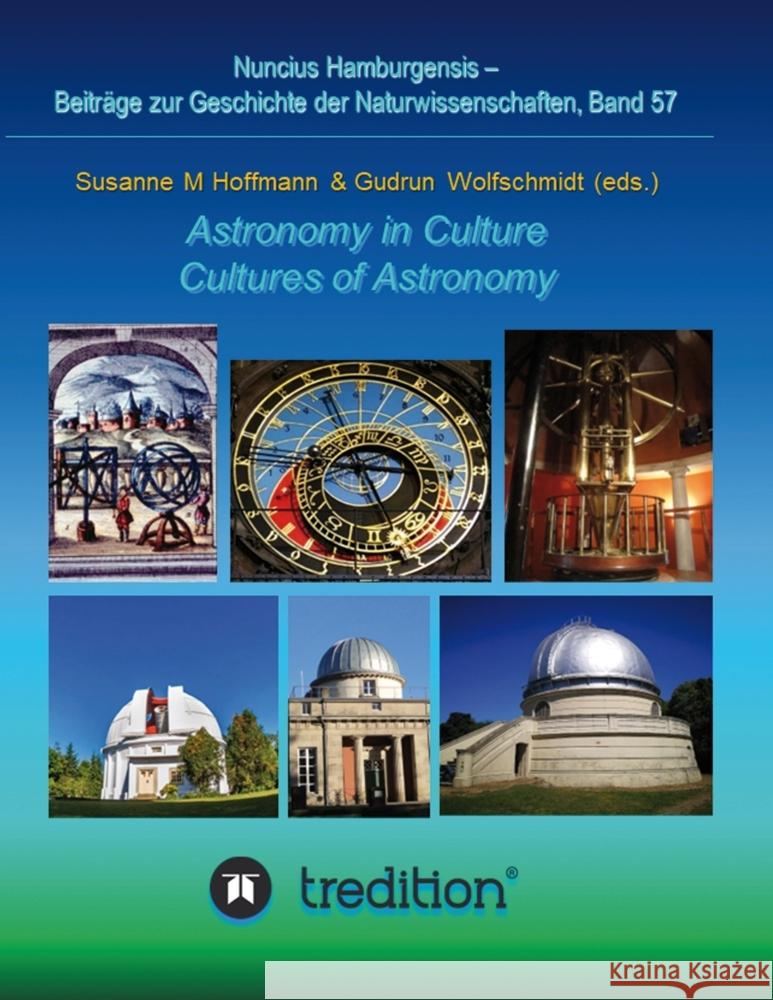Astronomy in Culture -- Cultures of Astronomy. Astronomie in der Kultur -- Kulturen der Astronomie. » książka
Astronomy in Culture -- Cultures of Astronomy. Astronomie in der Kultur -- Kulturen der Astronomie.
ISBN-13: 9783347712881 / Angielski / Miękka / 800 str.
Astronomy in Culture -- Cultures of Astronomy. Astronomie in der Kultur -- Kulturen der Astronomie.
ISBN-13: 9783347712881 / Angielski / Miękka / 800 str.
(netto: 241,83 VAT: 5%)
Najniższa cena z 30 dni: 253,92
ok. 10-14 dni roboczych
Dostawa w 2026 r.
Darmowa dostawa!
This book "Astronomy in Culture - Cultures of Astronomy" provides a cultural history of astronomy. After a keynote on the efforts to protect the dark sky as an intangible global heritage admired of all cultures under the World Heritage Convention, tangible places of astronomical heritage are described. Archaeoastronomical sites from different continents and astronomical observatories from the late Middle Ages to the 21st century are presented as cultural heritage (material culture) in Chapter 2.Chapter 3 outlines some intangible astronomical heritage of Antiquity to the Middle Ages. Astronomical observations in all cultures are the basis for time keeping and calendars all over the world. Constellations are represented as figures resembling animals or seasonal activities, and seasonal climate determines rituals and cultural festivals.Chapter 4 is devoted to some astronomical heritage presented in modern planetariums and museums representing the modern culture. A highlight is the network study of patterns stored in the planetarium software "Stellarium". Chapter 5 contains some cross-cultural comparisons involving the whole sky.Scholars from different academic backgrounds (archaeology, history of science, philology, art history, planetarium educators, computer/data science) present their studies of this traditional knowledge and how it has been transmitted and transformed over the millennia in the seven chapters of this impressive book.Dieses Buch "Astronomie in der Kultur - Kulturen der Astronomie" bietet eine Kulturgeschichte der Astronomie. Es beginnt mit den Bemühungen, den dunklen Himmel, der von allen Kulturen bewundert wird, im Rahmen der Welterbekonvention als immaterielles Erbe zu schützen. Astronomische Observatorien und archäoastronomische Stätten werden in Kapitel 2 als kulturelles Erbe (materielle Kultur) vorgestellt. Kapitel 3 bietet das immaterielle Erbe von der Antike bis zum Mittelalter. Astronomische Beobachtungen in allen Kulturen sind die Grundlage für Zeitrechnungen und Kalender auf der ganzen Welt. Sternbilder werden als Figuren dargestellt, die Tieren oder Tätigkeiten der Jahreszeiten ähneln, und das jahreszeitliche Klima bestimmt die Rituale und kulturellen Feste. Kapitel 4 ist einem Teil des astronomischen Erbes gewidmet, das in modernen Planetarien und Museen der modernen Kultur präsentiert wird. Ein Höhepunkt ist die Netzwerkstudie der Muster, die in der Planetariumssoftware "Stellarium" gespeichert sind. Kapitel 5 enthält einige kulturübergreifende Vergleiche, die den gesamten Himmel betreffen. Wissenschaftler mit unterschiedlichen akademischen Hintergründen (Archäologie, Wissenschaftsgeschichte, Philologie, Kunstgeschichte, Planetariumspädagogen, Informatik/Datenwissenschaft) stellen in den sieben Kapiteln dieses beeindruckenden Buches ihre Studien über dieses traditionelle Wissen und seine Übertragung und Veränderung im Laufe der Jahrtausende vor.











